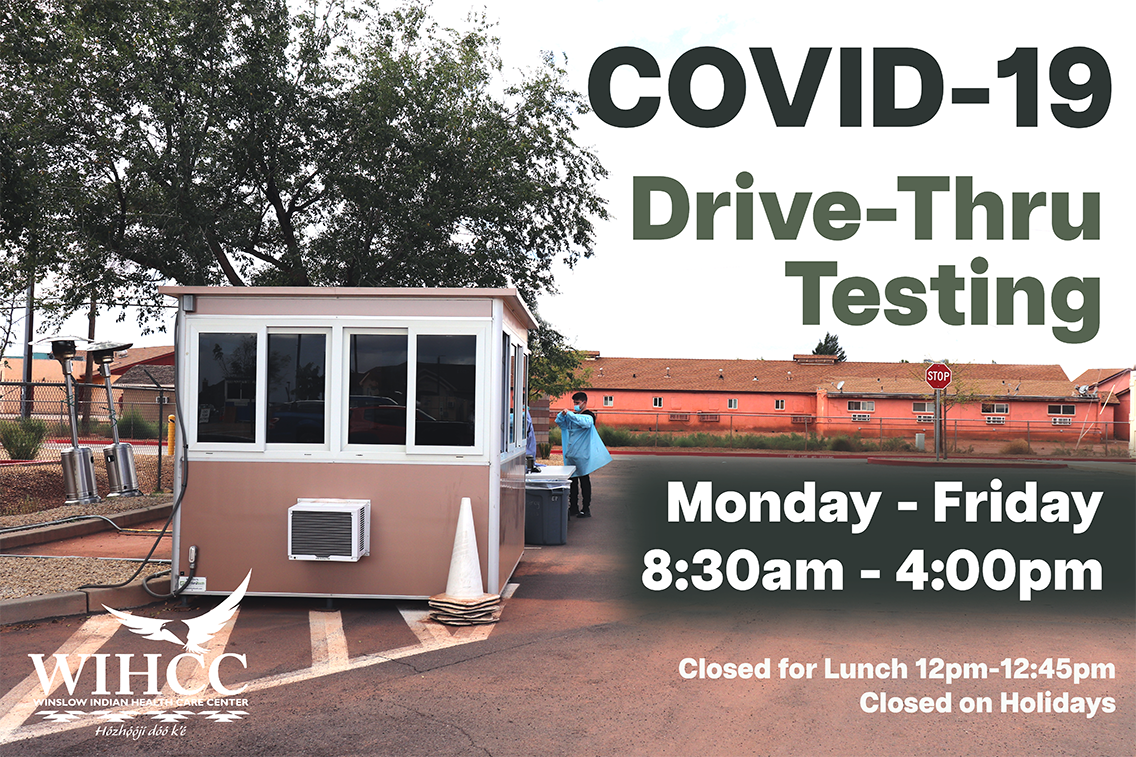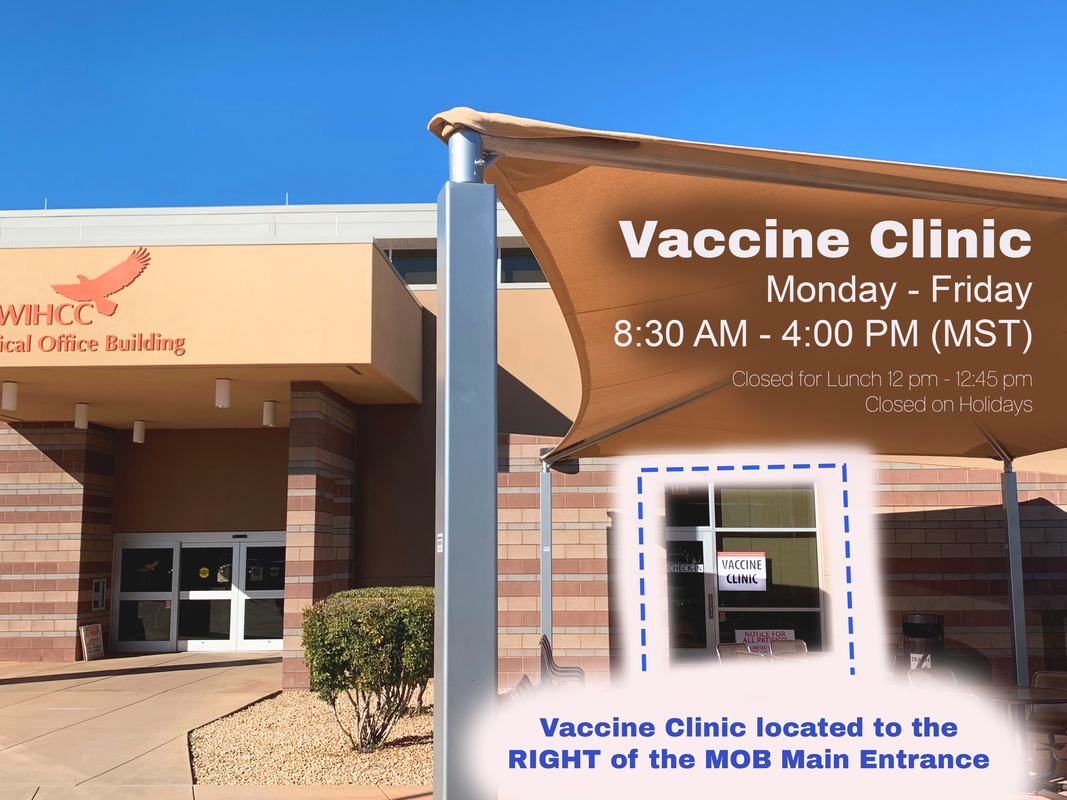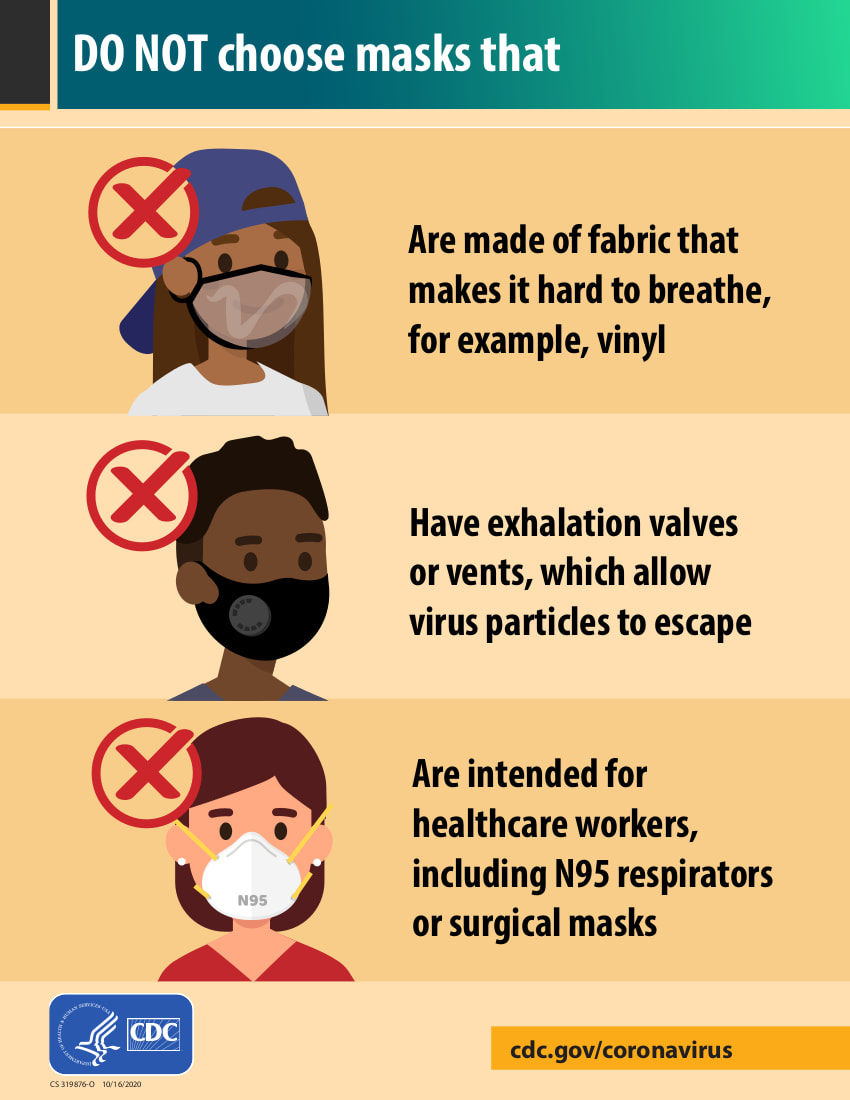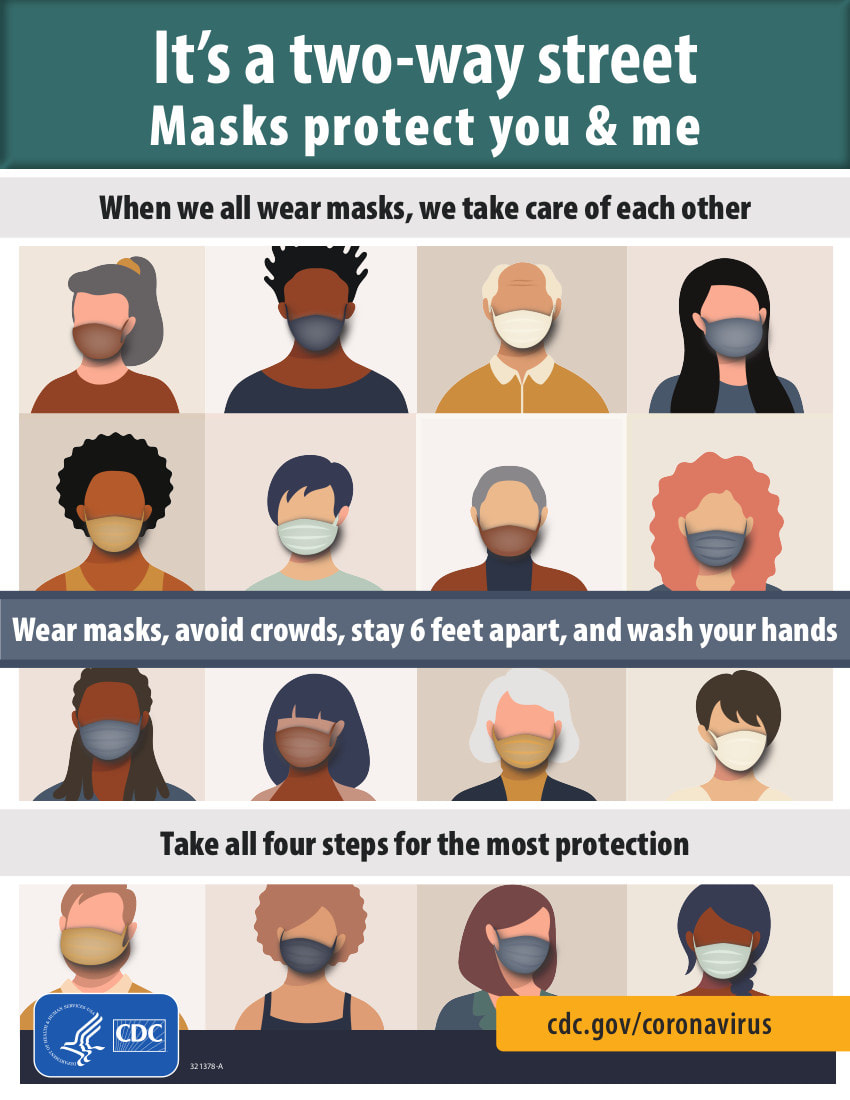COVID-19 Drive Thru Testing & COVID-19 Vaccination Clinic Hours
Monday - Friday
8:30 am - 4:00 pm
Closed for Lunch 12:00pm-12:45pm & Closed on Holidays
Location of COVID-19 Drive-thru Testing
Drive-thru is located to the north side of the MOB and Respiratory Clinic
Location of COVID-19 Drive-thru Testing
Drive-thru is located to the north side of the MOB and Respiratory Clinic
Location of Vaccine Clinic
WIHCC Vaccine Clinic is located to the North of the Main MOB entrance
WIHCC Vaccine Clinic is located to the North of the Main MOB entrance
To report a positive COVID home test result, please call (928) 289-1930
How to obtain your COVID-19 Test Results
Negative test results will NOT receive a phone call from WIHCC
Positive test results will receive a phone call from WIHCC
Other Options:
Directly from LabCorp. This is the FASTEST option.
Negative test results will NOT receive a phone call from WIHCC
Positive test results will receive a phone call from WIHCC
Other Options:
Directly from LabCorp. This is the FASTEST option.
- Go to https://patient.labcorp.com/landing
- There you can view and print official copies of your test results
- From your WIHCC Online Personal Health Record (PHR)
- Go to https://phr.ihs.gov/phr/PHRLogin and register
- Next, call WIHCC patient registration (928-289-4646) and email them a copy of your Driver’s License or ID card so they can verify you and link your online account with your medical record here.
- Using the PHR, you can view lab results from WIHCC. Such as vitals, and even request medication refills online.
- Call WIHCC’s COVID-19 Warmline 928-289-1930
For the most up-to-date information on the outbreak, please visit the CDC's COVID-19 website
Informational Videos
Cross Contamination
|
Life is better with clean hands.How often do we wash our hands and don't realize how good of job we are doing at cleaning our hands. You'll surprise yourself if you did this.
|
Knot and Tuck Your MaskHere is a simple way your disposable mask can fit you better which can make it more effective in protecting you against COVID-19. Please continue to do your part and wear your mask. Julia Thomas demonstrates how to Knot & Tuck Your Mask in the Navajo Language. Ahe'hee.
|
Dr. Michelle Tom a Diné Asdzáá, from the Great Navajo Nation works the frontlines endlessly along side her professional colleagues, shares additional information regarding COVID-19
|
Covid-19 Information
At the Winslow Indian Health Care Center, we want to help you and your family stay healthy during the Coronavirus outbreak of 2020. Below are videos about the Coronavirus disease 2019 and prevention tips both in Dine Bizaad (Navajo Language) and English.
The Centers for Disease Control and Prevention (CDC) has been closely monitoring an outbreak of respiratory illness caused by a new virus strain of coronavirus (CoV) named "Novel Coronavirus" or "nCoV" first identified in Wuhan, China. Coronaviruses are a large family of viruses that cause illness ranging from the common cold to more severe disease such as Severe Acute Respiratory Syndrome (SARS-CoV).
So, what is the coronavirus disease 2019? It is a disease caused by novel coronavirus (nCoV) and it has not been previously identified in humans. Coronavirus disease 2019 (abbreviated "COVID-19") is a respiratory illness that can spread from person to person. The virus is thought to spread mainly between people who are in close contact with one another (within about 6 feet) through respiratory droplets produced when an infected person coughs or sneezes. It also may be possible that a person can get COVID-19 by touching a surface or object that has the virus on it and then touching their own mouth, nose, or possibly their eyes, but this is not thought to be the main way the virus spreads. To Learn more about the spread of coronaviruses go to the CDC link at cdc.gov/coronavirus/2019-ncov/about/transmission.html.
Currently this is no treatment or vaccine to protect against COVID-19. The best way to prevent infection is to take everyday preventive actions, like avoiding close contact with people who are sick and washing your hands often.
The Centers for Disease Control and Prevention (CDC) has been closely monitoring an outbreak of respiratory illness caused by a new virus strain of coronavirus (CoV) named "Novel Coronavirus" or "nCoV" first identified in Wuhan, China. Coronaviruses are a large family of viruses that cause illness ranging from the common cold to more severe disease such as Severe Acute Respiratory Syndrome (SARS-CoV).
So, what is the coronavirus disease 2019? It is a disease caused by novel coronavirus (nCoV) and it has not been previously identified in humans. Coronavirus disease 2019 (abbreviated "COVID-19") is a respiratory illness that can spread from person to person. The virus is thought to spread mainly between people who are in close contact with one another (within about 6 feet) through respiratory droplets produced when an infected person coughs or sneezes. It also may be possible that a person can get COVID-19 by touching a surface or object that has the virus on it and then touching their own mouth, nose, or possibly their eyes, but this is not thought to be the main way the virus spreads. To Learn more about the spread of coronaviruses go to the CDC link at cdc.gov/coronavirus/2019-ncov/about/transmission.html.
Currently this is no treatment or vaccine to protect against COVID-19. The best way to prevent infection is to take everyday preventive actions, like avoiding close contact with people who are sick and washing your hands often.
Other Resources
|
Arizona Department of Health Services |





